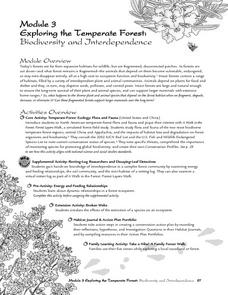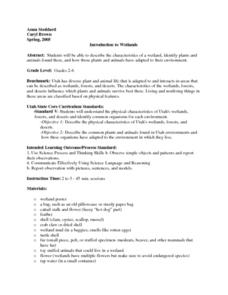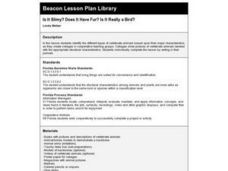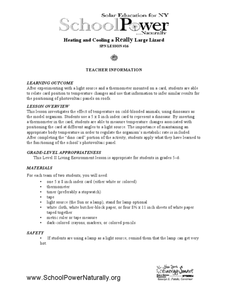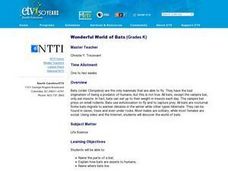Curated OER
What Kind of Animal Are You?
With the descriptions of six different animal groups (amphibians, birds, fish, insects, mammals, reptiles), students match different examples of animals to their proper groups (lizard to reptiles, girl to mammals, etc). The activity...
Curated OER
SPLASH – Monitoring Humpback Whales
Middle schoolers view a video about the humpback whale and why it is endangered. In this endangered species lesson, students recognize the importance of observing and following an endangered species in an ecosystem. Middle schoolers...
Curated OER
Exploring the Temperate Forest: Biodiversity and Interdependence
Students examine the consequences of cutting down large amounts of forests throughout the world. In groups, they use the internet to complete a module taking them on a tour through different temperate forests. To end the lesson, they...
Curated OER
Introduction to Wetlands
Students describe the characteristics of a wetland, identify plants and animals found there, and how those plants and animals have adapted to their environment. They visit stations, view a video, and complete a KWL about the wetlands.
Curated OER
What Makes a Cat a Cat?
Learners investigate the lives of pets by videotaping them. In this animal life lesson, students videotape a cat and other pets using school cameras in a computer lab. Learners review the footage from the cat and other animals and...
Curated OER
Creating a Food Web
Students investigate hunters and prey by creating a food web. In this animal life lesson, students investigate a single organism in preparation for a field trip, discovering its diet and habitat. Students each discuss their animal with...
Curated OER
Creating a Classification System
Students create classification system for Arctic-dwelling animals, the Arctic hare in particular.
Curated OER
Biology In Elementary Schools
Students classify animals into six major animal groups and describe the characteristics of the animals found within each group. In this living and non-living animals lesson, students observe a variety of animals, both living and...
Curated OER
Is It Slimy? Does It Have Fur? Is It Really a Bird?
Sixth graders identify the different types of vertebrate animals based upon their major characteristics, as they create collages in groups. Collages show pictures of vertebrate animals labeled with the appropriate structural...
Curated OER
Crossword
In this crossword worksheet, learners, after discussing different types of birds and animals, complete a crossword puzzle with twelve different clues.
Curated OER
Fur and Feathers
In this word scramble worksheet, students unscramble words that are names of animals with fur or birds with feathers. Students write 10 answers.
Curated OER
Roadkill Museum
Students use roadside kill to use taxidermy skills, become comfortable working with animals and dissecting.
Curated OER
Classifying Commercial Marine Species
Learners investigate taxonomy. They explore some of the commercial marine species caught in Magdalena Bay and develop a classification system for presented animals.
Curated OER
Explore: Third Grade Scents
Students use the olfactory sense to determine if a marker is appropriate 'food' or not. This experience helps students explain why so many animals rely on the sense of smell to find prey.
Curated OER
Kids for Conservation: Animal Unit
Students discuss animal needs and characteristics. In this animal mini-unit, students complete three activities studying different animals, their needs, how they have evolved, and how to protect them.
Curated OER
Draw T. rex
Students explore how scientists determine what prehistoric animals looked like based on their bones. They draw a picture of the skull of a Tyrannosaurus Rex by copying an image from an overhead or book.
Curated OER
Wild Animals 1 - Reading
In this wild animals worksheet, students read the terms, name the animals, complete a word search, and more. Students complete 5 activities.
Curated OER
Heating and Cooling a Really Large Lizard
Students investigate the effect of temperature on cold-blooded animals, using a 5 x 8 inch index card to represent a dinosaur as their model organism. Students measure temperature changes that occurs at different angles to a light...
Curated OER
Soak it up
Students complete a hands on activity using hard boiled eggs, food coloring, tape, cups, water, and a knife to show how permeability affects animals. In this permeability lesson plan, students complete this activity and learn how...
Curated OER
Investigating Evolutionary Questions: Bats, Whales, Reptiles, Birds, Animal Classification
Students are guided through a process in which three questions are addressed by retrieving beta hemoglobin sequences from online databases, and using online tools to compare those sequences in student-selected animals.
Curated OER
Reptiles
Students investigate reptiles and reptile habitats. They listen to books, cut out magazine pictures of reptiles from National Geographic, sort plastic animals into the categories of mammal, reptile, or amphibian, watch a National...
Curated OER
Animal Classification
Third graders differentiate between vertebrates and invertebrates, and identify the main characteristics of mammals, fish, reptiles, amphibians, and birds. They sort and categorize different types of balls, discuss the characteristics...
Curated OER
Wonderful World of Bats
Students create a book about bats. They write a letter to a scientist containing questions about bats. They compare the socialization of bats to humans; compare the needs of bats to humans and other animals.
Curated OER
Bats and Boas Abound
Students investigate Puerto Rican boa constrictors and bats. For this animal science lesson, students read an article about the bats and snakes found in Puerto Rico. Students use various art supplies to create a diorama of the habitat of...




